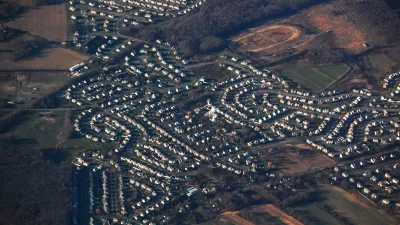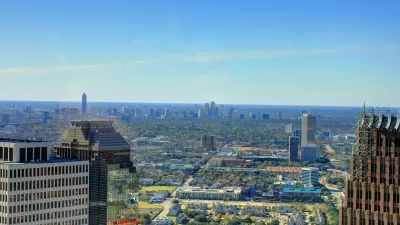Compared with European averages, U.S. and Canadian residents spend 30-50 percent more money and time on transport due to dispersed, automobile-dependent development.

According to data published by economists Stephen Redding and Matthew Turner, the average American household spent approximately 18 percent of its budget on transportation compared with just an average of 12.8 percent among its peer. That means a typical U.S. household spent about five percentage points more of its income, about $1,500 annually, on transportation than the residents of other developed countries.
Table courtesy of City Observatory.
Similarly, the average American worker spent about 51 daily minutes commuting, compared with 39 average daily commute minutes for all other countries. This means that over the course of a year with 250 working days, the typical American commuter spends about 51 more hours commuting than workers in other high income countries. Valued at $15 per hour, the additional cost of commuting to US workers comes to $770 per worker worker per year.
While there may be other reasons for these disparities, they probably reflect American cities' more sprawled, automobile-dependent development patterns.
FULL STORY: Sprawl Tax: How the US stacks up internationally

Alabama: Trump Terminates Settlements for Black Communities Harmed By Raw Sewage
Trump deemed the landmark civil rights agreement “illegal DEI and environmental justice policy.”

Study: Maui’s Plan to Convert Vacation Rentals to Long-Term Housing Could Cause Nearly $1 Billion Economic Loss
The plan would reduce visitor accommodation by 25% resulting in 1,900 jobs lost.

Planetizen Federal Action Tracker
A weekly monitor of how Trump’s orders and actions are impacting planners and planning in America.

Federal Homelessness Agency Places Entire Staff on Leave
The U.S. Interagency Council on Homelessness is the only federal agency dedicated to preventing and ending homelessness.

Restoring Northern India’s Himalayan ‘Water Temples’
Thousands of centuries-old buildings protect the region’s natural springs and serve as community wells and gathering places.

Milwaukee to Double Bike Share Stations
Bublr Bikes, one of the nation’s most successful, will add 500 new e-bikes to its system.
Urban Design for Planners 1: Software Tools
This six-course series explores essential urban design concepts using open source software and equips planners with the tools they need to participate fully in the urban design process.
Planning for Universal Design
Learn the tools for implementing Universal Design in planning regulations.
Caltrans
Smith Gee Studio
Institute for Housing and Urban Development Studies (IHS)
City of Grandview
Harvard GSD Executive Education
Toledo-Lucas County Plan Commissions
Salt Lake City
NYU Wagner Graduate School of Public Service





























